
Castile and León is an autonomous community in northwestern Spain. It was created in 1983 by merging the provinces of the historic region of León: León, Zamora and Salamanca, with those of Old Castile : Ávila, Burgos, Palencia, Segovia, Soria and Valladolid. The provinces of Santander and Logroño, which until then had been included in the "Old Castile" administrative division, opted out of this merger and formed the new Autonomous Communities of Cantabria and La Rioja respectively. Condado de Treviño and La Puebla de Arganzón, the two municipalities that make up the Treviño enclave, are geographically surrounded by the neighboring Basque Country Autonomous Community, but belong to Castile and León.
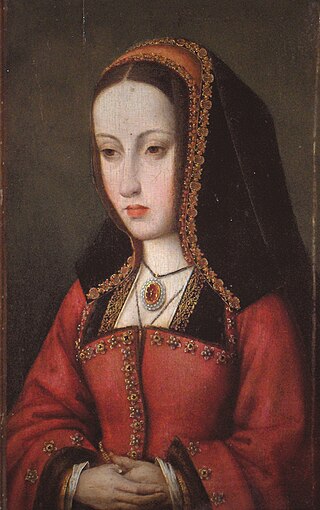
Joanna, historically known as Joanna the Mad, was the nominal queen of Castile from 1504 and queen of Aragon from 1516 to her death in 1555. She was the daughter of Queen Isabella I of Castile and King Ferdinand II of Aragon. Joanna was married by arrangement to the Austrian archduke Philip the Handsome on 20 October 1496. Following the deaths of her elder brother John, elder sister Isabella, and nephew Miguel between 1497 and 1500, Joanna became the heir presumptive to the crowns of Castile and Aragon. When her mother died in 1504, she became queen of Castile. Her father proclaimed himself governor and administrator of Castile.

Juntas de Ofensiva Nacional-Sindicalista was a nationalist and fascist movement in 1930s Spain. In 1934, it merged with the Falange Española into the Falange Española de las JONS.

Castilian nationalism or "Castilianism" is a fringe political movement that advocates for the national recognition of Castile, and in some cases, its independence from Spain.

The Castilian Left is a leftist nationalist political movement active in the Spanish autonomous communities of Castile-La Mancha, Castile and Leon and Community of Madrid. It strives to advocate for the national recognition of Castile, and in some cases, its independence. Other current political parties include Tierra Comunera, Castilian Party, and Ahora Castilla.

The Crown of Castile was a medieval polity in the Iberian Peninsula that formed in 1230 as a result of the third and definitive union of the crowns and, some decades later, the parliaments of the kingdoms of Castile and León upon the accession of the then Castilian king, Ferdinand III, to the vacant Leonese throne. It continued to exist as a separate entity after the personal union in 1469 of the crowns of Castile and Aragon with the marriage of the Catholic Monarchs up to the promulgation of the Nueva Planta decrees by Philip V in 1716.
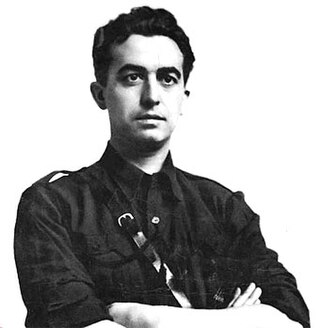
Onésimo Redondo Ortega was a Spanish Falangist politician. He founded the Juntas Castellanas de Actuación Hispánica, a political group that merged with Ramiro Ledesma's Juntas de Ofensiva Nacional-Sindicalista and José Antonio Primo de Rivera's Falange Española.

The 2011 Castilian-Leonese regional election was held on Sunday, 22 May 2011, to elect the 8th Cortes of the autonomous community of Castile and León. All 84 seats in the Cortes were up for election. The election was held simultaneously with regional elections in twelve other autonomous communities and local elections all throughout Spain.

The Battle of Moclín, also known as the Disaster of Moclín took place in the Granadian municipality of Moclín on 23 June 1280. The battle pitted the troops of the Emirate of Granada, commanded by Muhammad II, the Sultan of Granada, against those of the Kingdom of Castile and the Kingdom of León who were composed mainly of mercenaries and of members of the Order of Santiago, being commanded by the contemporary grand master of the order Gonzalo Ruiz Girón and by Sancho, son of King Alfonso X of Castile.
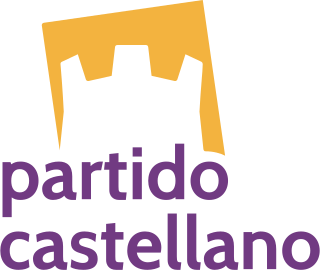
The Castilian Party, formerly the Party of Castile and León until 2011, is a Spanish political party resulting from the union of several Castilian nationalist and regionalist political parties from Castile and León, Madrid and Castile-La Mancha. The most relevant of the components is Tierra Comunera.
Ahora Castilla was a political pact signed by a string of Castilian nationalist political parties and associations whose primary aim was to found a political platform. The signatory groups were: Tierra Comunera, Castilian Left, Castilian Soup and Castilian Land. This pact was embodied in form of a manifesto known as The Manifesto of Alcalá de Henares, because it was publicly presented in the city of Alcalá de Henares, (Spain).

The 1995 Castilian-Leonese regional election was held on Sunday, 28 May 1995, to elect the 4th Cortes of the autonomous community of Castile and León. All 84 seats in the Cortes were up for election. The election was held simultaneously with regional elections in twelve other autonomous communities and local elections all throughout Spain.

The 2003 Castilian-Leonese regional election was held on Sunday, 25 May 2003, to elect the 6th Cortes of the autonomous community of Castile and León. All 82 seats in the Cortes were up for election. The election was held simultaneously with regional elections in twelve other autonomous communities and local elections all throughout Spain.

Yesca is a Castilian nationalist and anticapitalist youth organization in Castile. It's recognized by Castilian Left as its youth referent. Yesca defends the right of self-determination of Castile, a nation that would be integrated by the current Spanish autonomies of Castilla y León, Castilla-La Mancha, Madrid, Cantabria, La Rioja and the area of Requena-Utiel in the Valencian Country.

Castilian Unity is a moderate conservative Castilian nationalist political party active in Castilla-La Mancha. UdCa was founded in Ciudad Real by Emilio López Nieto, former secretary general of the PP in Ciudad Real, in December 2001 and formed, in part, by former members of the Regionalist Party of Castilla-La Mancha (PRCM). Its implementation outside the province of Ciudad Real is negligible.
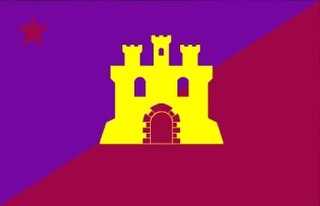
Izquierda Comunera is a leftist nationalist political party active in the Spanish Community of Madrid. It defended the national recognition of Castile and its independence. The party is also defined as socialist, antifascist, feminist and republican.

Doris Benegas Haddad was a Spanish political lawyer specialising in criminal law, particularly causes related to women and left-wing politics. She was also a political leader, leading a regional branch of the communist movement in the 1970s as well as the pro-independence nationalist leftist coalition, the Castilian Left, from 2002 to her death in 2016.

Francisco Igea Arisqueta is a Spanish politician of the Citizens party between 2016 and 2023. A doctor by profession, he led the party in the 2019 Castilian-Leonese regional election, and became vice president of the Junta of Castile and León after forming a government with the People's Party leader Alfonso Fernández Mañueco. In the 2022 election, his party lost all their seats except his own. He was previously a member of the Congress of Deputies (2015–2019) and came runner-up in his party's 2020 leadership election. He was expelled from Citizens in 2023 for criticising their decision not to contest the 2023 Spanish general election, and retained his seat as an independent.
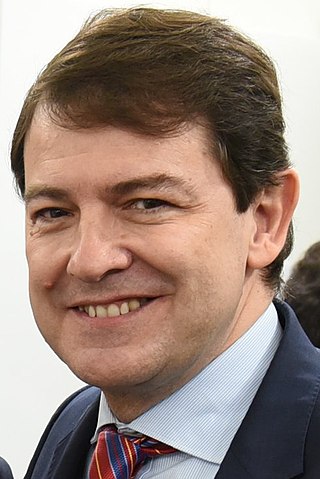
The next Castilian-Leonese regional election will be held no later than Saturday, 21 March 2026, to elect the 12th Cortes of the autonomous community of Castile and León. All 81 seats in the Cortes will be up for election. The electoral calendar of Castile and León was altered as a result of the 2022 snap election, meaning the election will be held in a date different from that of the regularly scheduled May regional and elections in 2023.

Luis Fuentes Rodríguez is a Spanish politician of the Citizens party. He was a member of the Cortes of Castile and León from 2015 to 2022, serving as the legislature's president from 2019.
















